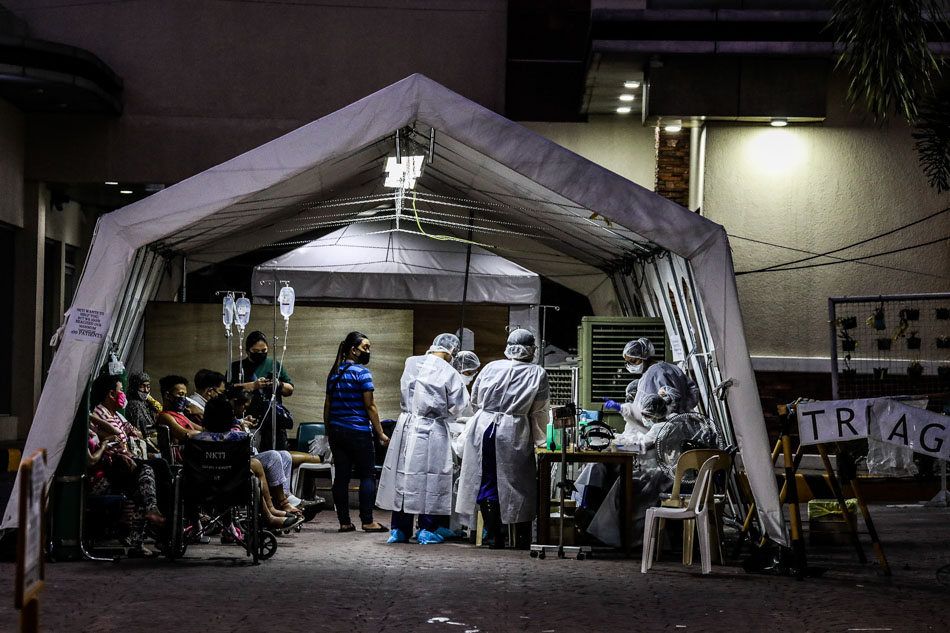Coronavirus spread in PH may subside in June, health expert says | ABS-CBN
ADVERTISEMENT

Welcome, Kapamilya! We use cookies to improve your browsing experience. Continuing to use this site means you agree to our use of cookies. Tell me more!
Coronavirus spread in PH may subside in June, health expert says
Coronavirus spread in PH may subside in June, health expert says
ABS-CBN News
Published Apr 02, 2020 03:03 AM PHT
|
Updated Apr 02, 2020 07:33 AM PHT
MANILA - Coronavirus infections in the Philippines may subside in June, a health expert said Wednesday, as cases of local transmission continue to rise rapidly.
MANILA - Coronavirus infections in the Philippines may subside in June, a health expert said Wednesday, as cases of local transmission continue to rise rapidly.
"In my estimate, it may only slow down by May or June," said Dr. Rontgene Solante, head of adult infectious diseases in San Lazaro Hospital.
"In my estimate, it may only slow down by May or June," said Dr. Rontgene Solante, head of adult infectious diseases in San Lazaro Hospital.
As Luzon entered its third week of the enhanced community quarantine, where more than 50 million people have been ordered to stay home, coronavirus transmissions should have slowed down by now, he told radio DZMM.
As Luzon entered its third week of the enhanced community quarantine, where more than 50 million people have been ordered to stay home, coronavirus transmissions should have slowed down by now, he told radio DZMM.
"Why is it until now we're getting new cases? It's already [past] 14 days. The incubation period of the virus is 14 days. When the lockdown was imposed, there should be no transmission anymore," Solante said in Filipino.
"Why is it until now we're getting new cases? It's already [past] 14 days. The incubation period of the virus is 14 days. When the lockdown was imposed, there should be no transmission anymore," Solante said in Filipino.
ADVERTISEMENT
"Is it a failure of the lockdown or we had inadequate lockdown procedures that we didn't foresee?" he added.
"Is it a failure of the lockdown or we had inadequate lockdown procedures that we didn't foresee?" he added.
To date, the number of coronavirus disease 2019 (COVID-19) infections in the Philippines has risen to 2,311.
To date, the number of coronavirus disease 2019 (COVID-19) infections in the Philippines has risen to 2,311.
The total figure includes 96 deaths and 50 people who recovered from the disease, which originated last year in the Chinese metropolis of Wuhan.
The total figure includes 96 deaths and 50 people who recovered from the disease, which originated last year in the Chinese metropolis of Wuhan.
The Philippines on Tuesday saw its biggest increase in coronavirus infections with 538 new cases, which health officials attributed to increased testing.
The Philippines on Tuesday saw its biggest increase in coronavirus infections with 538 new cases, which health officials attributed to increased testing.
During the interview, Solante stressed the importance of the lockdown, saying it is an effective way to stem the virus spread.
During the interview, Solante stressed the importance of the lockdown, saying it is an effective way to stem the virus spread.
"If we didn't have a lockdown, we could have become like the US. We might not only have more than 2,000 cases. It could have doubled or tripled right now," he said.
"If we didn't have a lockdown, we could have become like the US. We might not only have more than 2,000 cases. It could have doubled or tripled right now," he said.
The highly contagious virus has sickened more than 163,000 people and killed 2,800 others in the US, latest data from the World Health Organization (WHO) showed.
The highly contagious virus has sickened more than 163,000 people and killed 2,800 others in the US, latest data from the World Health Organization (WHO) showed.
As scientists scramble to develop a vaccine against the disease, Solante said they are treating some COVID-19 patients with a combination of anti-malarial drugs hydroxychloroquine and the antibiotic azithromycin.
As scientists scramble to develop a vaccine against the disease, Solante said they are treating some COVID-19 patients with a combination of anti-malarial drugs hydroxychloroquine and the antibiotic azithromycin.
"It's part of our standard treatment guidelines. But there are only specific patients who qualify for the criteria... Generally, the outcome has been good based on our assessment," he said.
"It's part of our standard treatment guidelines. But there are only specific patients who qualify for the criteria... Generally, the outcome has been good based on our assessment," he said.
And amid public clamor for mass testing to fast-track the screening of possible COVID-19 carriers, Solante said the government should focus instead of conducting selective tests.
And amid public clamor for mass testing to fast-track the screening of possible COVID-19 carriers, Solante said the government should focus instead of conducting selective tests.
"I don't totally agree with the mass testing. First, if we have to conduct mass testing, there should be an infrastructure in place," he said.
"I don't totally agree with the mass testing. First, if we have to conduct mass testing, there should be an infrastructure in place," he said.
Solante added, "Instead, we make selective tests and prioritize those highly vulnerable, including health care workers."
Solante added, "Instead, we make selective tests and prioritize those highly vulnerable, including health care workers."
Read More:
Rontgene Solante
San Lazaro Hospital
health
virus
coronavirus
2019 Novel Coronavirus
2019-nCoV
2019 Novel Coronavirus acute respiratory disease
2019-nCoV ARD
coronavirus disease 2019
ADVERTISEMENT
ADVERTISEMENT



